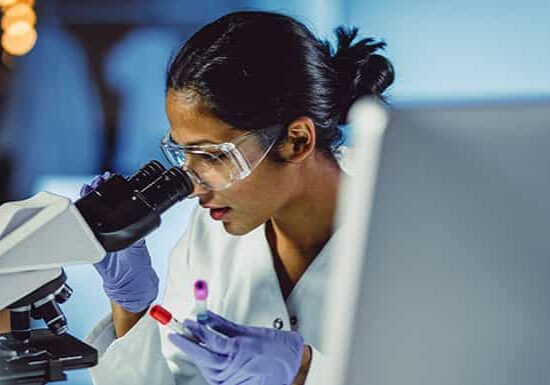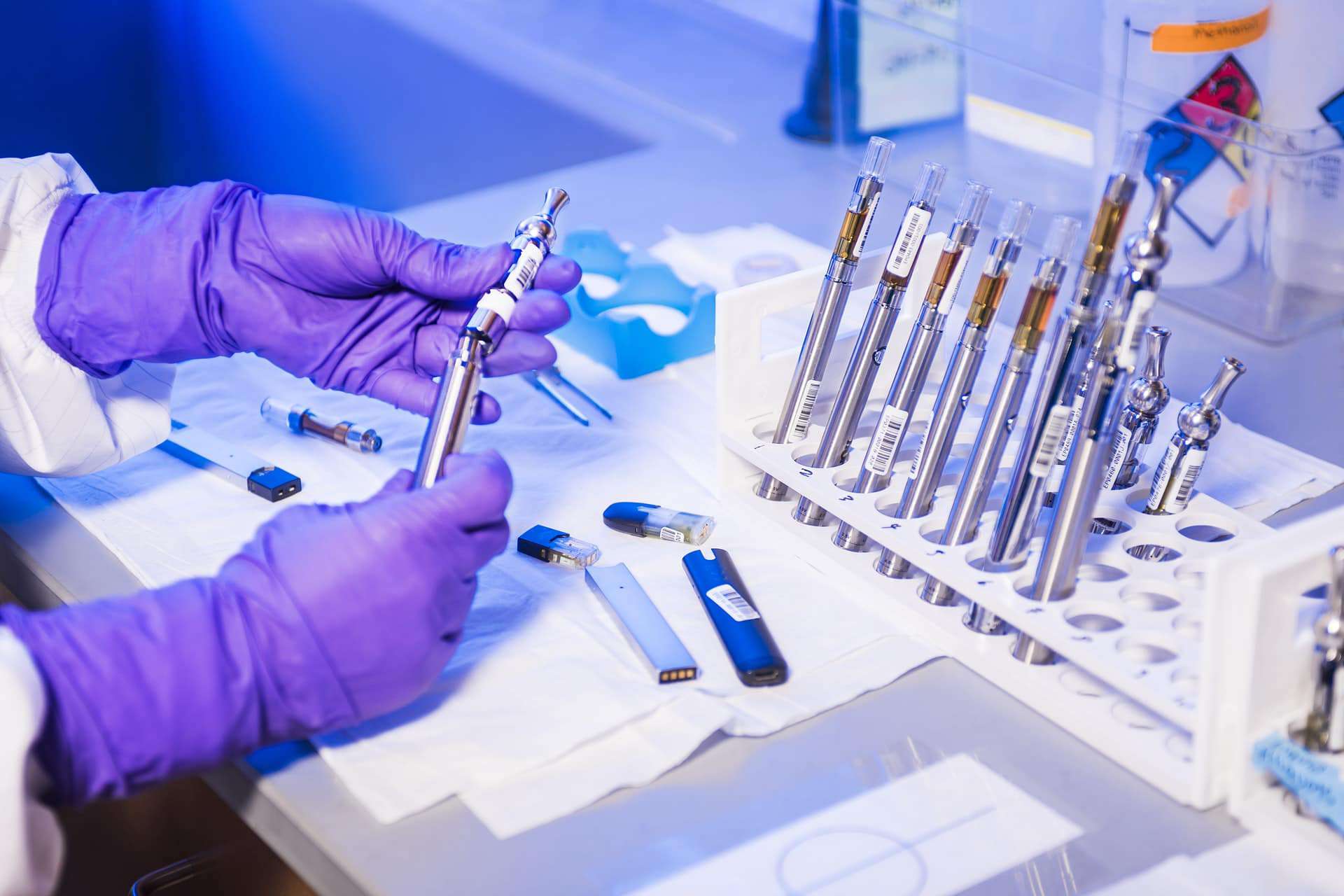Here’s What You Can Do With A Biology Degree
Updated: June 19, 2024
Published: March 31, 2021

If you’re wondering, “What can I do with a biology degree?” then the extensive answers may surprise you. The study of biology is an intriguing discipline that marries together various types of science to provide a better understanding of life on Earth. Biology jobs exist amongst different sectors and industries. To initiate oneself in the field, pursuing a certificate program in human biology can be potentially beneficial.
We will break down the definition of biology, employers of biology graduates, and some of the best biology jobs to consider.

Photo by National Cancer Institute on Unsplash
What is Biology?
Biology is the study of life. It comes from the Greek words “bios,” which means life, and “logos,” which means study. As such, biologists do exactly that — study the structure, origin, function, and evolution of all living organisms. There are many fields within the broad scope of biology.
Here’s a look at the nine types of biology:
- Biochemistry
- Botany
- Cellular biology
- Ecology
- Evolutionary biology
- Genetics
- Molecular biology
- Physiology
- Zoology
Given the complexity of how life works, these fields and their respective and required knowledge tend to overlap. For example, if you study cellular biology, then you’ll cover some topics in molecular biology and biochemistry. This makes a degree in biology both challenging and well-rounded.
Within all branches of biology, there are five general frameworks that help those who major in biology understand more about living organisms. Here’s the five main components:
- Cell theory
- Energy
- Equilibrium
- Evolution
- Heredity
Who Hires Biology Graduates?
Earning professional experience with a biology degree isn’t complicated because there’s a lot of different industries that hire biology majors. For example, some opportunities are available in:
- Schools
- Research and laboratories
- Zoos
- Veterinary clinics
- Pharmaceutical companies
- Government agencies
- Conservation facilities
- Natural science museums
Granted, these aren’t all the employers of biology majors, but it gives a good understanding of how broad your opportunities can be when you choose to major in biology.

Biology Jobs to Consider
If you have an interest in the subject and love to learn about life and how living organisms function, then biology could be a great major for you! Some biology jobs to consider obtaining include:
-
Academic Researcher
Academic researchers apply their learned knowledge to research. The goal of an academic researcher is to publish their findings in journals or books. As an academic researcher, you can find work as a research associate, higher education professor, or a postdoctoral research associate. You will work at a high level to collaborate with other experts within the field of biology as you analyze data and come to conclusions. A major aspect of being an academic researcher besides conducting research will be writing research papers for peer- reviewed journals.
-
Pharmacologist
Working as a pharmacologist will entail researching and testing medicines and the chemical compositions of drugs. Pharmacologists are specialists in understanding how medicine is decomposed and absorbed in the body. As such, pharmacologists can find positions working for pharmaceutical manufacturers or teaching at a university, or even conducting research. They may work in crime labs or research labs, too. To become a pharmacologist, you’ll likely need to earn a Pharm.D., or Doctor of Pharmacy. Before that, you can earn a bachelor’s degree in biology to learn foundational information you’ll need for your postgraduate degree.
-
Marine Biologist
Marine biologists study life under the sea. From marine plants to animals and microorganisms, a marine biologist’s work can take them to these natural environments and the laboratory. Their major goal is to better understand life in the world and see how humans and organisms affect ecosystems. With a degree in marine biology, graduates can work in academic research, consulting, policy making, outreach, charity or academic research, to name a few ideas.
-
Biotechnologist
Biotechnologists focus their studies on the genetic, physical, and chemical components of organisms with the goal to create new technologies or processes that enhance human life. These experts can design processes to boost energy efficiency or food productivity, for example. They may also work to create vaccines. It’s most common to find a biotechnologist working for biotechnology companies or agencies. When you work as a biotechnologist, it’s common to specialize in one subject, like: pharmacology, virology, biochemistry, molecular biology, etc.
-
Research Scientist
Research scientists spend the majority of their time conducting experiments and reviewing results. Depending on where they work, their experiments have different focuses, and could be to improve commercial processes or develop new products, for example. Often, research scientists work independently but are part of a larger team.
-
Secondary School Teacher
Secondary school teachers work in middle and high schools, teaching students who tend to be between 11 to 18 years old. As a biology major, you can become a biology or life sciences teacher and fulfill curriculum requirements to pass on your knowledge to the next generation of learners. Teachers deliver lessons, assess students’ understanding and communicate how students are doing with their parents. Of course, there are many more daily duties involved in being a teacher, but the latter are some of the biggest aspects of the job.
-
Soil Scientist
As the name implies, a soil scientist studies soil. You’ll evaluate information regarding the soil’s chemistry, physics, and biology in order to help manage issues like climate change, environmental quality, human health, land remediation, and biodiversity. Soil scientists carry out field work and collect samples of soil from various environments to then study its composition. Their knowledge of soil is transformed into useful insights to help resolve global issues.
-
Biological Technician:
A biological technician is also called a laboratory assistant. They work to assist in studies to obtain results. Some of their duties include documenting results and carrying out calculations. This knowledge is learned when obtaining a degree in biology through labs, research, and working with faculty. Technician positions can be found in non-profit research centers, biotechnology firms, medical schools, and government agencies.
-
Biochemist
Majoring in biology can prepare you to become a biochemist, which is a role that applies laboratory experience and scientific research skills to create new products. Biochemists help to understand how drugs affect the human body and can help to design biotechnology studies for humans.
-
Health Educator
Health educators work to educate the public and students about wellness and best practices to promote healthy behavior. To create successful programs, they apply the scientific method. Health educators use their understanding of biology to share scientific information that is understandable to the common person.
Useful Skills for Your CV
Along with your academic degree in biology, there are some skills that stand out to those who hire biology graduates. The range of technical knowledge is compounded by:
- Research and data analysis abilities
- Strong communication skills — verbal and written
- Ability to present in front of groups
- Math and computer literacy
- Project management
- Problem-solving
- Business awareness and initiative
Life’s Work on Life
The study of life can present many opportunities to forge a career that becomes your life’s work. Biology jobs provide those who fill them with challenges, rewards, and a continuously changing environment. By combining technical knowledge, science, math, and communication, biology majors are well-rounded graduates that have many job prospects ahead of them.
